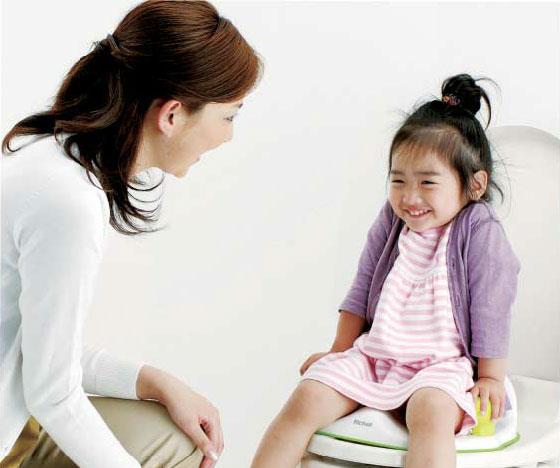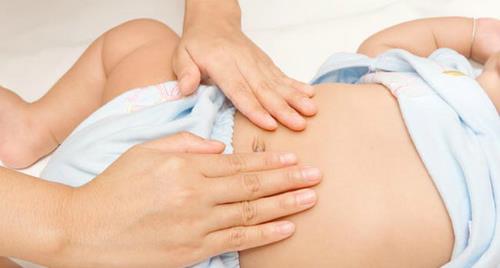Anorexia, slow weight gain and even malnutrition are the consequences that constipation can cause for your baby. MarryBaby will tell you "all over" all information about this unpleasant disease
How do I know if my child is constipated?
When your baby is a toddler, there is no exact number or distance between a baby's bowel movements. You should just consider the normal daily routine of your baby. Your baby may go out after each meal or for a day or two after that or it can be longer between bowel movements. The way your baby's bowel movements depend on what he eats and drinks, how he works and how fast he digests and poop.
The signs you need to pay attention to:
- The number of bowel movements is small, especially when the baby has not defecated for 4 days or more and feels uncomfortable when walking.
- The stool is solid, dry and hard to squeeze.
- Baby's feces in diapers, in potty or pants are very loose. Loose stools can pass through hard stools in the lower intestine and out in the form of loose stools in diapers or baby pants. If you see these signs, do not think your baby has diarrhea, most likely it is a sign of constipation.
Why is my child constipated?
- Eating too little fiber: If your baby eats a lot of milk, cheese, yogurt or peanut butter and doesn't have enough vegetables and fruits, grains may be fertilized.
- Fear of potty: If your child is pressured to practice potty, he may hold it off. If your baby shows signs of stress when having to go to the bowel, such as cramping, arching back and red face but failing to come out, he may hold on.

You should create a comfortable mentality when practicing the toilet
Even if your baby is potty, he may not be sitting long enough to go through. This results in a buildup of waste that causes the colon to swell and tighten. The dilated colon makes the stools bigger and firmer, making the baby hold up so he doesn't have to sit on the potty.
Lack of water: If your child does not drink enough water , the body will respond by absorbing more fluids from what they eat and drink and even from waste. This leads to dry, solid stools, making it difficult for the baby to have a bowel movement.
Sedentary: Walking helps blood circulate to the baby's digestive system. Therefore, when the baby is not active, it will be more difficult to go outside.
What to do when my child is constipated?
- Avoid giving your baby foods that cause constipation: Dairy products like milk, cheese, yogurt and ice cream. Also, if you feed your baby too many bananas or carrots can also cause your baby to be constipated.
Increase your baby's fiber intake: You should give your baby plenty of wheat crackers, whole grains, breads and vegetables such as plums, apricots, wafers, peas and broccoli.

Tell mothers how to supplement fiber for babies and children Many mothers have a headache in adding fiber to their babies because most children are lazy to eat fruits, vegetables, and children often suffer from problems. Constipation symptoms visit. Is there any simple diet that can add fiber to your baby?
- To soften stools, let your baby drink more water. Water is the best choice, but a little plum or peach juice works as well. However, you should limit the amount of juice your baby drinks each day to prevent tooth decay and anorexia. Babies who drink enough water will change 4 to 5 wet diapers a day or urinate at least every five or six hours.
- Encourage your baby to crawl, climb and walk every day to increase blood circulation throughout the body.
- Belly massage: Place three fingers under your baby's navel and press gently but deeply into the belly with your fingers. Press until you feel comfortable. Continue gently but evenly for three minutes.

Massage for your baby is also a way to help children avoid constipation
- Do not pressure your baby to potty when he is not ready. Forcing your baby to potty practice can either frighten or resist and will potentially hold off bowel movements. Instead, you should increase the amount of fiber in your baby's diet, pause on potty training and practice again when you feel your baby is ready.
- Encourage your baby to use the potty as soon as he or she needs to go to the toilet. If your baby says he doesn't want to go, try giving him a potty seat for 5 to 10 minutes after breakfast and dinner. (Children who are constipated for a long time may not be aware that their rectum is full.) Try to comfort your baby by reading while sitting on the potty. Don't force your baby to sit if he doesn't like it, or he'll think of potty training as punishment.
- Talk to your baby's doctor about treatment: They may prescribe stool softeners, lubricants such as mineral oil, anal suppositories or laxatives. Occasionally it is okay to prescribe medicine for your baby, but if you use too much, your baby may depend on it for bowel movements.

Diagnosis of children through waste For young children with incomplete digestive system, “what to eat” will leave many useful information for parents to easily diagnose their child's health status.
Note: If your child refuses to have a bowel movement, then the treatment with suppositories or enema can make him uncomfortable. Always consult your doctor before attempting this treatment.
If your baby has dry and solid stools that cause sensitive skin near the anal opening (you can see cracks, called anal fissures or a little bit of blood), you can apply aloe vera lotion to heal the crack. . Be sure to tell your doctor about these cracks.















